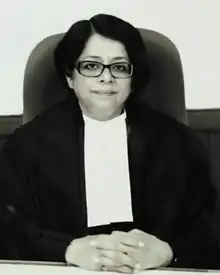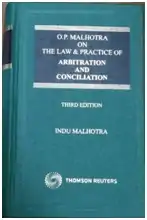Indu Malhotra
Indu Malhotra is a Judge and former Senior Counsel in the Supreme Court of India.
Hon'ble Mrs Justice Indu Malhotra | |
|---|---|
 | |
| Judge[1] of Supreme Court of India | |
| Assumed office 27 April 2018[2] | |
| Nominated by | Dipak Misra |
| Appointed by | Ram Nath Kovind |
| Personal details | |
| Born | 14 March 1956[3] Bangalore, Mysore State, India |
| Alma mater | Campus Law Centre, Faculty of Law, University of Delhi |
She was the second woman to be designated as Senior Advocate by the Supreme Court,[4] and she has also authored the third edition of a commentary The Law and Practice of Arbitration and Conciliation (2014).[5]
Early life and education
She was born on 14 March 1956 in Bangalore. The youngest child of Om Prakash Malhotra, a Supreme Court senior advocate & distinguished author, and Satya Malhotra. She did her schooling at Carmel Convent School, New Delhi, before doing did her B.A. (Hons.) and later Masters in Political Science from Lady Shri Ram College, University of Delhi.
After obtaining her master's degree, she worked briefly as a lecturer in Political Science in Miranda House and Vivekananda College, Delhi University. She then completed her Bachelor of Laws from Campus Law Centre of the Faculty of Law, University of Delhi in 1982.
Career
Indu Malhotra joined the legal profession in 1983, and was enrolled with the Bar Council of Delhi. In 1988, she qualified as an Advocate-on-Record in the Supreme Court, and secured the 1st position in the examination, for which she was awarded the Mukesh Goswami Memorial Prize on National Law Day.
She was appointed as the Standing Counsel for the State of Haryana in the Supreme Court from 1991 to 1996. She represented various statutory corporations like Securities Exchange Board of India (SEBI), Delhi Development Authority (DDA), Council for Scientific and Industrial Research (CSIR), Indian Council for Agricultural Research (ICAR), before the Supreme Court. In 2007, she was designated as a Senior Advocate by the Supreme Court of India. She became the second woman to be designated by the Supreme Court after a gap of over 30 years. She has been appointed Amicus curiae by different benches of the Supreme Court in some matters. Recently, she was appointed as an amicus for restoration of Jaipur as a heritage city.
Indu specializes in the law of arbitration, and has appeared in various domestic and international commercial arbitrations. In December 2016, Indu was made a member of the High Level Committee (HLC) in the Ministry of Law and Justice to review Institutionalization of the Arbitration Mechanism in India.
After serving as a legal counsel in the Supreme Court for 30 years, she had been unanimously recommended for appointment as a judge of the Supreme Court.[6] Her appointment was confirmed and ordered by the Government on 26 April 2018, and she is the first woman judge to be elevated directly from the Bar.[7]
Important cases
Some of the important cases in which she has appeared are:
- India Oxygen v. Collector of Central Excise [1998 Suppl. SCC 658]
- Union of India v. Harjeet Singh Sandhu [(2001) 5 SCC 593]
- SBP & Co. v. Patel Engineering Ltd. [(2005) 8 SCC 618]
- Jaya Shah v. Bombay Stock Exchange [(2004) 1 SCC 160]
- Harshad C. Modi v. DLF [(2005) 7 SCC 791]
- Everest Copiers v. State of Tamil Nadu [(1996) 5 SCC 390]
- Khaleel Ahmed Dakhani v. Hatti Gold Mines Co. Ltd. [(2000) 3 SCC 755]
- Harish Verma & Ors. v. Ajay Srivastava [(2003) 8 SCC 69]
- Hindustan Poles Corporation v. Commissioner of Central Excise [(2006) 4 SCC 85]
- R. Kalyani v. Janak C. Mehta & Ors. [(2009) 1 SCC 516]
- Ramesh Kumari v. State (NCT of Delhi)
- Booz Allen Hamilton Inc. v. S.B.I. Home Finance Ltd. & Ors [(2011) 5 SCC 532]
- Yograj Infrastructure Ltd. v. Ssang Yong Engineering & Construction Co. Ltd. [(2011) 9 SCC 735]
- Union of India v. Master Construction Co. [(2011) 12 SCC 349]
- P.R. Shah, Shares and Stock Broker (P) Ltd. v. B.H.H. Securities (P) Ltd. [(2012) 1 SCC 594]
- A.C. Narayanan v. State of Maharashtra [(2013) 11 SCALE 360]
- Pune Municipal Corporation & Another v. Harakchand Misirimal Solanki & Others, [(2014) 3 SCC 183].

Indu Malhotra has specialised in the law of arbitration, and has appeared in various domestic and international commercial arbitrations. She is a Fellow of the Chartered Institute of Arbitrators (CIArb.), England. She has been empanelled as an Arbitrator with several Institutional Arbitration bodies like Indian Council of Arbitration (ICA), Delhi International Arbitration Centre (DAC), ASSOCHAM etc. She has recently authored an exhaustive and illuminating commentary on the Arbitration and Conciliation Act, 1996 published by Thomson Reuters.[8] Eminent jurists have described it as a legal classic on arbitration.Her dissenting note on the majority judgement for allowing women's entry in to the famous Sabari mala temple got wide attention. As the lone women justice on the panel she noted in her dissenting judgement that “what constitutes an essential religious practice is for the religious community to decide” and not a matter that should be decided by the courts. She added that “notions of rationality cannot be invoked in matters of religion by courts”[9][10]
Justice Indu Malhotra was part of the two-judge panel that awarded the shebaitship of Padmanabhaswamy Temple to the Travancore Royal family in a historic judgement passed on 13 July 2020.
Membership of committees and nominations
She has been a member of various Committees constituted by the Supreme Court from time to time. She is one of the members of the Vishakha Committee constituted by the Supreme Court of India.[11] She was nominated as a member of the Editorial Committee for publication of the official journal "Nyaya Deep" of the National Legal Services Authority during the period 2004–2013. She was nominated as a member of the Central Authority of the National Legal Services Authority, a statutory body constituted under the Legal Services Authorities Act, 1987 on 7 January 2009. She was appointed a member of the Supreme Court (Middle Income Group) Legal Aid Society, constituted by the Supreme Court of India from 15 July 2005 for 3 years. She was nominated as a member of the Indo-British Legal Forum held in January 2003 and again in 2008. She represented India in the Convention on the Rights of the Child, held by the Commonwealth Secretariat in May 1998 at Dhaka, Bangladesh. In 2005, she was nominated by the Chief Justice of India in the category of ‘eminent persons’ as a member of the General Council of the Gujarat National Law University. She has been nominated by the Ministry of Corporate Affairs to the Central Council and Disciplinary Committee of the Institute of Chartered Accountants of India, a statutory body established under the Chartered Accountants Act, 1949.
Social work
She is engaged in social and charitable work, and is a Trustee of Save Life Foundation,[12] which is a non-profit, non-Governmental organisation. Save Life has been formed with the objective of prevention of road accidents, and formulating a system for providing immediate post-accident response to save the life of the victims.
Publications and academic pursuits
Indu Malhotra has authored a Commentary on the Law and Practice of Arbitration in India, which was released on 7 April 2014 [13] by the Hon'ble Chief Justice of India.[14] She has published articles in various journals and magazines.
Bibliography
- The Law and Practice of Arbitration and Conciliation: The Arbitration and Conciliation Act (1996)[15]
References
- "Chief Justice & Judges - Supreme Court of India". Supremecourtofindia.nic.in. Retrieved 16 September 2018.
- "Indu Malhotra Takes Oath As Supreme Court Judge Amid Row Over Appointments". NDTV. 27 April 2018.
- "Who is Indu Malhotra? First woman lawyer to be directly elevated as Supreme Court judge from Bar". Financialexpress.com. 26 April 2018. Retrieved 16 September 2018.
- "Lady lawyer pierces glass ceiling". Times of India. 9 August 2007. Retrieved 7 April 2014.
- Srivats, K. R. (7 April 2014). "Arbitrators need to play more active role, says CJI". The Hindu "Business Line". Retrieved 18 June 2014.
- Rajagopal, Krishnadas (11 January 2018). "In a first, Collegium recommends woman advocate for direct appointment as SC judge". The Hindu. Retrieved 16 September 2018.
- "Collegium recommends Indu Malhotra, KM Joseph J. for appointment to Supreme Court". Bench & Bar. Bangalore, India. 11 January 2018. Archived from the original on 29 April 2018. Retrieved 12 January 2018.
- "Thomson Reuters presents Third Edition of O. P. Malhotra's Commentary". India Infoline (IIFL). Archived from the original on 16 August 2018.
- "Sabarimala verdict: 5 key reasons why Justice Indu Malhotra differed with majority view - Times of India". The Times of India. Retrieved 24 November 2018.
- "Sabarimala verdict: Justice Indu Malhotra dissents — Can't invoke rationality in religion". The Indian Express. 29 September 2018. Retrieved 24 November 2018.
- "Looking into harassment complaints by lawyers: SC panel". Indianexpress.com. 1 February 2014. Retrieved 18 June 2014.
- "Archived copy". Archived from the original on 7 June 2014. Retrieved 18 June 2014.CS1 maint: archived copy as title (link)
- "GAR Article: DELHI: White Industries in the spotlight". Globalarbitrationreview.com. Retrieved 16 September 2018.
- "Dire need of professionalism in dealing with arbitration: CJI". Business Standard. 7 April 2014. Retrieved 18 June 2014.
- Google Books: "The Law and Practice of Arbitration and Conciliation: The Arbitration and Conciliation Act". Retrieved 18 August 2014